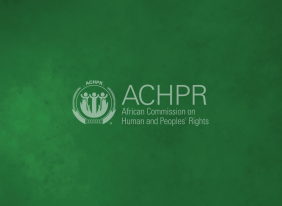"
Oral Statement by Nord Sud XXI to the 51st Ordinary Session of the African Commission on Human and Peoples’ Rights 21 April 2012, Banjul, the Gambia
Item 7 –WG on Extractive Industries and the Environment
Nord-Sud XXI, the Pan African Climate Justice Alliance and International-Lawyers.org strongly support the mandate of the Working Group on Extractive Industries and the Environment. We wish to encourage the Working Group to ensure that due account is taken of the man-made problem of climate change; a problem that is narrowly related to the Working Group’s mandate.
It is indigenous peoples who suffer disproportionately from the impact of extractive industries as their territories are home to over sixty percent of the world’s most coveted mineral resources. The unsustainable exploitation of natural resources has led to the worst forms of environmental degradation, human rights violations and dispossession of traditional lands.
The unsustainable exploitation and consumption of natural resources is also the single most important cause of climate change. This is particularly true for fossil fuels. And while this exploitation has been a key enabling factor in the development of industries and societies in rich countries, most people in Africa who are adversely affected by environmental degradation and climate change have reaped few or no benefits from this process of industrialization.
Our organizations are not against development. Quite the contrary: we recognize that development is a right of all peoples. The right is indivisible from other human rights protected in international instruments, including in the context of indigenous peoples the right to free, prior and informed consent. It is also inseparable from other principles of international law, such as the polluter pays principle. We believe that the extractive industries bear special responsibility for repayment of the climate debt to peoples and societies who did not contribute to climate change, yet suffer most from its detrimental effects.
We note with concern that references to human rights law are continuously being eliminated from texts that are being negotiated under the United Nations Framework Convention on Climate Change. This is despite the fact that the African Commission in Resolution 159 urged African governments to ensure that these principles be included in such texts. It is however not too late. Negotiations under the UNFCCC are ongoing, and human rights safeguards can and must be included in future agreements.
At the same time, we must recognize that climate change-induced human rights violations are not remedied by language in texts. We need tangible solutions. The Working Group can play an important role in this context by using its intellectual capacity to developing possible legal remedies against climate injustice. These must be based on the historic responsibility of States and industries for causing the problem, and their capacity to assist peoples and governments in the realization of human rights.
We also once again express our hope that the Commission urgently carries out the study called for in resolution 159, as a starting point for future action. We remain willing to assist you in this important matter.
Thank you for your attention.









